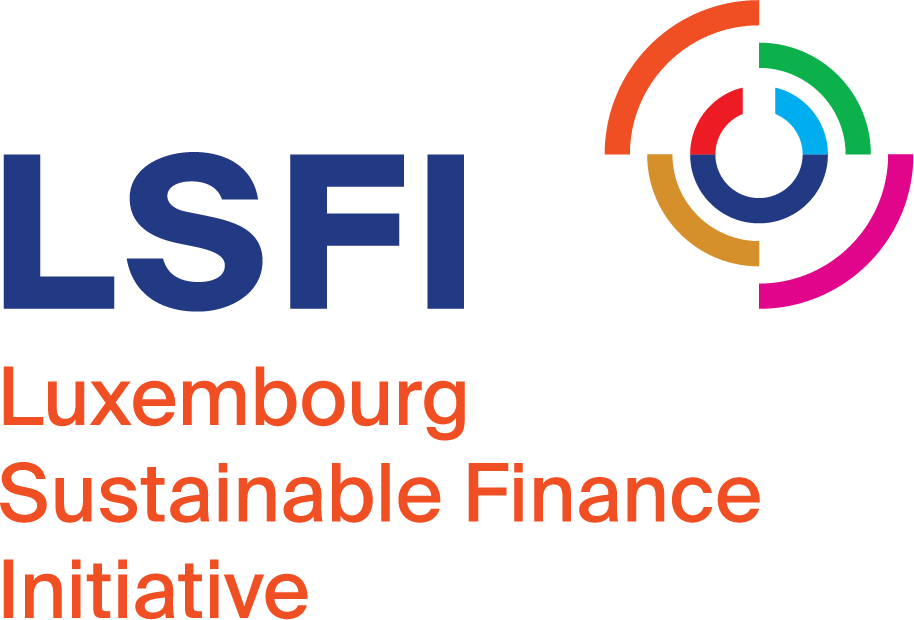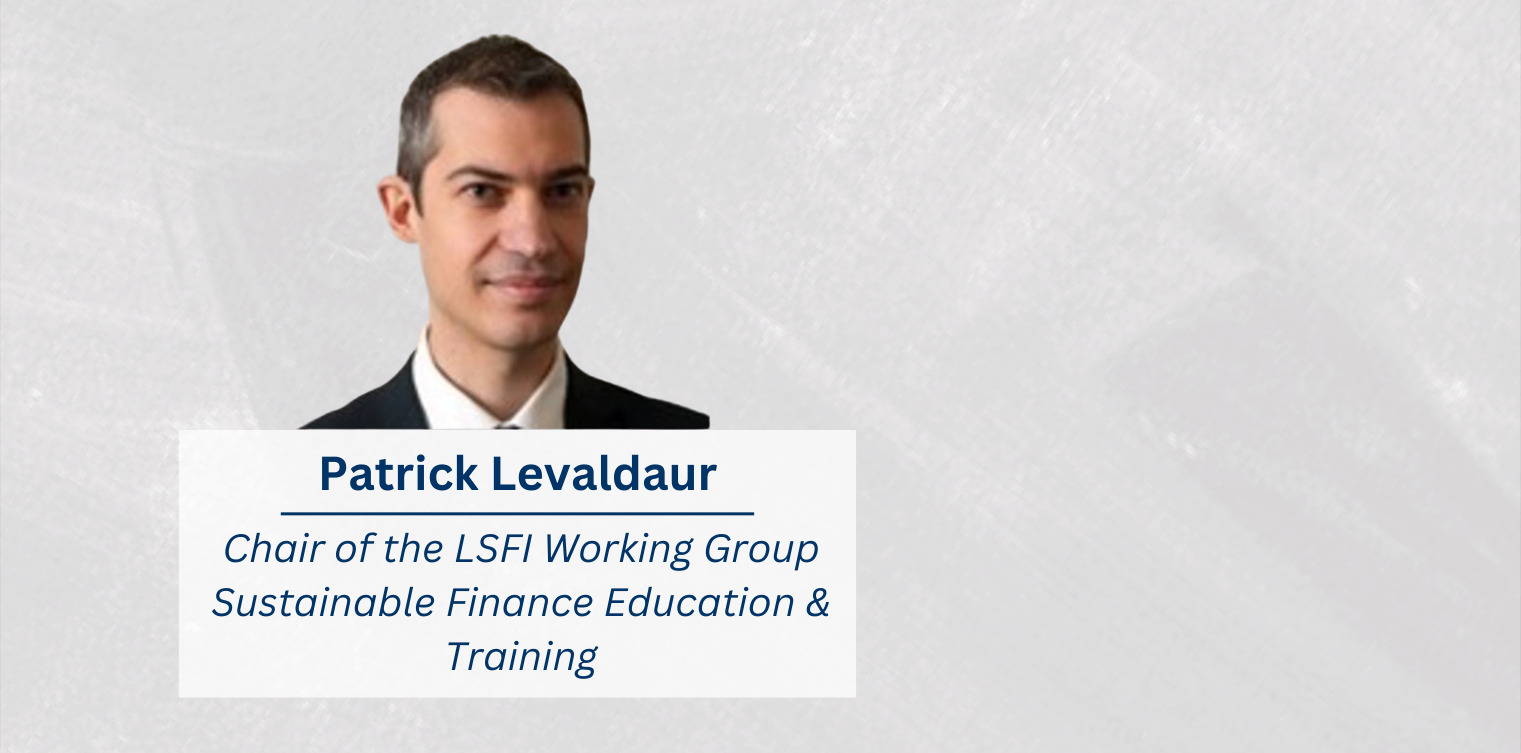As with any new discipline, education and skills are key ingredients in the transition towards sustainability of the financial sector. Last year, the LSFI launched the “Sustainable Finance Education and Training Working Group”. The objective was to analyse the sustainable finance skills and competencies of Luxembourg’s financial centre, and to assess how to strengthen them.
This month, we interviewed Patrick Levaldaur, General Manager of EFPA Luxembourg and chair of this working group. We have discussed with him about the analysis conducted by the working group over the last 6 months and the recently released whitepaper „Sustainable Finance Training Needs & Gaps Analysis in the Luxembourg Financial Sector„. We also spoke about the biggest challenge that training providers face regarding sustainable finance education.
(Luxembourg Sustainable Finance Initiative) What was the objective of the LSFI working group sustainable finance and training?
(Patrick Levaldaur) As with any „new“ discipline, developing and having the right skills is key. In this respect, the working group aimed to cover and strengthen the sustainable finance skills and competencies of Luxembourg’s financial sector players to push sustainable finance. To reach this objective, the LSFI established a set of objectives and activities to be developed by the working group members. The first one was to map and identify gaps and needs and propose practical solutions to develop suitable sustainable finance-related education paths/training for professionals from the financial sector. In particular, the analysis conducted over the last six months which led to the white paper „Sustainable Finance Training Needs & Gaps Analysis in the Luxembourg Financial Sector„, released earlier this month, responded to this objective.
Besides, other objectives include promoting sustainable finance-related trainings and exchanging information on this topic’s various training activities in Luxembourg and abroad. These will be developed in the near future when the working group reconvenes.
(LSFI) Can you describe the work of the WG over the last months and how the analysis has been conducted?
(PL) I will focus on the methodology and steps followed by the working group. The working group kicked off in November 2022 and held nine sessions for six months, where we focused on achieving the first objective. To do so, we decided to start by looking at the main training providers within the country that offer publicly available courses in sustainable finance and some international ones. The idea behind this was to understand the current offering better. These training institutions gave the working group a round of presentations introducing their current offering following a standardised template.
After the presentation sessions, we started identifying the main topics where professionals need to be knowledgeable within the sustainable finance field and, thus, those that sustainable finance trainings should cover. Following the identification of these topics, the working group also listed the primary job functions and roles in the Luxembourg finance sector and matched the identified topics with these job functions. These resulted in a matrix indicating what topic each job function should be knowledgeable of, which we call „the needs“. Finally, the working group members defined at which level (generalist or advanced) the identified profile should be knowledgeable for a given topic. For us, this groundwork was the baseline for the subsequent identification of gaps.
The next step was to map and assess what topics per profile and at which level the training courses within the scope cover. For this, the working group requested each training provider to fill in a matrix with the information from their training courses. After, the LSFI secretariat and myself (the working group chair) compiled all of them to create a unique matrix; this one showed us the current „offer“. As a last step, we cross-checked the „offer“ matrix with the „needs“ one, which resulted in the findings of this assessment. In particular, two types of findings resulted from the analysis: 1) for some topics, there is no training targeting particular job profiles at the required level; 2) for some topics, the offering for particular job profiles is limited (diversity gaps).
A more detailed methodology can be found in the whitepaper I mentioned above and accessible here.
(LSFI) What are some of the key findings from the study?
(PL) Through the methodology mentioned above, we identified key characteristics and gaps of the Luxembourg sustainable finance training offering and analysed international courses.
In general terms, the Luxembourg sustainable finance training offering presents a high degree of completion. Numerous training institutions provide a diverse offer, a large variety of themes is covered to some degree and multiple job profiles are taken into account. Likewise, Luxembourg training providers have shown high dynamism; new modules or courses get developed as the market’s needs evolve.
However, as mentioned above, we have also found some gaps. For this interview, I will highlight only a few; however, you can find the exhaustive list in the whitepaper.
One of these is the topic „How to sell and/or market an ESG product“, on this occasion, training gaps for client-facing roles were found. Another relevant gap refers to „Impact investing, inclusive finance, and blended capital“, when gaps were found for asset servicing, depository, middle and back office, and other functions; and diversity ones for credit specialists. This is also the case of „Applications of TCFD and other norms such as EET“ where diversity gaps for financial/wealth management and product specialists, sustainable and ESG task force members, and c-suite profiles were found.
All these topics are considered key by the working group members to push sustainable finance further; thus, we have recommended that they should be addressed in the next year. Going forward, the LSFI will work with Luxembourg training providers and sustainable finance players to find the best way to fill the identified gaps. In some cases, there might be a need to create new trainings. In other cases, it might be just a matter of enlarging the scope of the already present and well-functioning ones.
(LSFI) What surprised you the most concerning the finding of the analysis conducted?
(PL) The most surprising thing for me is the concentration of training players on certain themes while others are not being covered.
This is guided by how the Luxembourg financial centre is structured but also shows that the financial industry concerns are similar regardless of the business line. This can also be explained by the fact that the regulatory framework for sustainable finance is still young, which naturally concentrates training needs on specific key themes.
Today, when it comes to Sustainable Finance, training in Luxembourg focuses mainly on regulatory frameworks. This is quite understandable for a financial centre that is very attached to risk management, compliance and reporting. On the other hand, few training courses focus on products and management techniques or are aimed directly at retail banking.
Despite this, I believe this is where the greatest risk of ‚greenwashing‘ lies. This is not because the professionals working in this field want to mislead the end customers about the real impact generated by sustainable finance products, but because the concepts, ratings, labels and processes that shape sustainable finance are still young, under development and can easily be misunderstood by professionals with little or no training in these subjects.
As mentioned above, one key gap identified by our working group is „How to sell and/or market an ESG product?“. If we want to avoid a bad reputation for sustainable finance, financial advisers both in the banking and insurance industries, need to know about sustainable finance products, their objectives and also their limitations.
This is probably the most significant challenge that financial institutions face today. If they fail to educate all the functions within their institutions (from the front office to directors) about these issues, they will expose themselves and sustainable finance to reputational risk.
(LSFI) You head EPFA Luxembourg, a non-profit organisation providing professional training and certifications. What’s the biggest challenge you have observed that training providers face regarding sustainable finance education? What about the students?
(PL) The greatest challenge is raising awareness and dispelling reputational issues surrounding sustainable finance. In my opinion, this happens especially with professionals already involved in the financial markets. There are still cases when professionals explain that they do not discuss sustainable finance with their clients because they do not believe in it. Others refer to the „financial duty“ over sustainable finance requirements. Of course, this is not always the case and I have also observed that, for instance, younger students are more passionate and concerned about this issue.
In this regard, there is a great deal of educational work to be done here to remind people that the objectives of sustainable development are not incompatible with the constraints of resources, financial objectives and current practices in the financial markets, banks, and asset management companies.
Without falling into extremism, the challenge for training centres is to show that the tools provided by sustainable finance are additional strings to the investors‘ bow in identifying the opportunities and risks of financial products. Training centres need to show that sustainable finance is not just a ‚lessons giver‘ but a toolbox for identifying certain risks/opportunities, diversifying the risks in a portfolio, managing these portfolios better, and being more transparent with the end customer.
Above all, even if the climate emergency is very real today, training centres must remember that sustainability is, by definition, a slow and lengthy process. If a regulator regulates and an investor invests, sustainable finance inevitably comes up against the technological constraints imposed by the underlying industries and the capacity to develop new technologies adapted to industrial processes that are more mindful of sustainable development objectives. As a result, sustainable finance criteria need to be considered over the long term to assess the trends that emerge effectively. This is also what the training centres must teach with complete transparency.





